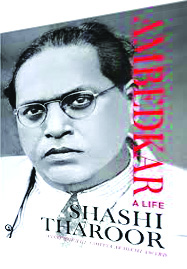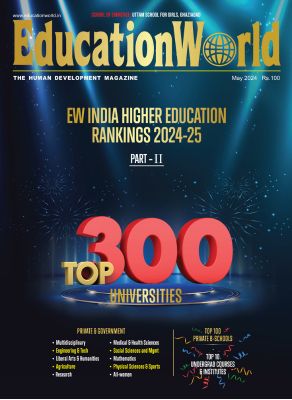 Ambedkar: A Life
Ambedkar: A Life
Shashi Tharoor
Aleph Book Company
Rs.599
Pages 226
This book is about the confrontation between Gandhi and Ambedkar, a profound disagreement on the status of Dalits in free, independent India
India’s uniquely successful freedom movement in last few decades of British Raj over the subcontinent was almost entirely due to the generalship and masterful strategic planning of Mahatma Gandhi. He took on the self-serving sanctimony of the British upper classes who had assumed the white man’s burden of civilizing the natives in blissful ignorance of several millennia of Indian history, and hoisted them on their own petard.
Nevertheless there were some flaws in the judgement of the greatest man who walked upon earth, in scientist Albert Einstein’s memorable tribute. And some leaders of the Indian freedom movement didn’t share this sentiment. The most prominent among them was Dr. Bhim Rao Ambedkar, leader of the Depressed Classes (Dalit) emancipation movement and principal author of the liberal and egalitarian Constitution of India, which was unanimously enacted into law on January 26, 1950.
Dr. Ambedkar is the subject matter of this engrossing biography written by prolific author and Member of Parliament Shashi Tharoor, whose credentials include 21 non-fiction and four works of fiction. Written in seemingly effortless Tharoor style, it is at the same time deeply researched with an impressive bibliography.
Ambedkar, A Life traces the journey of the man popularly known as the father of the Constitution of India from his early years as a boy born into Maharashtra’s Mahar community, at the bottom of the Hindu varna caste hierarchy, to his fortuitous education at Columbia University, New York and the London School of Economics, his chairmanship of the Committee to draft the Constitution and emergence as the undisputed leader of India’s Dalit community aka, ‘untouchables’.
It is a poignant story of an extraordinary individual who suffered the unalterable indignities of the pernicious Hindu caste system throughout his life, his heroic deeds and inestimable contribution to Indian jurisprudence and transformation of free India into a modern state, notwithstanding. In the end in the last years of his life, as Tharoor recounts, Ambedkar and a large contingent of his Dalit followers, in a historic conversion in Nagpur adopted Buddhism, a casteless egalitarian creed.
Essentially this forthright book is about the confrontation between Gandhi and Ambedkar, a profound disagreement on the future of the country and the status of Dalits in free, independent India.
Ambedkar was in favour of reserved electoral reservation for Dalits on a par with the communal reservations for Muslims in Islam dominated states/regions, because he believed that upper caste Hindus would never grant ‘untouchables’ equal status as citizens of independent India.
In the 1930s when the British government under prime minister Stanley Baldwin proposed separate electorates and seats in the provincial assemblies and Central Legislature for Muslims, Sikhs, Christians and Europeans, Ambedkar insisted that the Depressed Classes should also have the right to vote their own representatives into these popularly elected assemblies.
This proposition was adamantly opposed by Gandhi and the Congress Party as a conspiracy to split the majority Hindu vote. He felt that the “government had no right to separate the Depressed Classes from the Hindu electorate to which they rightfully belonged… Ambedkar on the other hand, consistent with his long-expressed views, welcomed the principle of separate representation for his community, which had been oppressed for millennia,” writes Tharoor.
In protest against the communal awards, Gandhi went on a fast unto death in Poona’s Yerwada jail where he was incarcerated at the time. But with his health having deteriorated precariously, Ambedkar reluctantly accepted the principle of reserved seats for the Depressed Classes but Dalit representatives would be elected by all voters, not just Depressed Class voters in reserved constituencies. And after independence, even though 15 percent of seats in the Lok Sabha are reserved for Dalits, they are elected by all voters in those constituencies, ensuring that Dalit militants are not elected. Throughout his life, Ambedkar deeply regretted signing the Poona Pact (1932) as emotional blackmail and a sell-out under extreme pressure.
As detailed by the author, the philosophical outlook of these two undoubtedly great leaders who shaped modern India was profoundly different. Gandhi wanted India to become a nation of self-governing and self-sustaining village republics to attain the goal of Ram impressive bibliography.
Ambedkar, A Life traces the journey of the man popularly known as the father of the Constitution of India from his early years as a boy born into Maharashtra’s Mahar community, at the bottom of the Hindu varna caste hierarchy, to his fortuitous education at Columbia University, New York and the London School of Economics, his chairmanship of the Committee to draft the Constitution and emergence as the undisputed leader of India’s Dalit community aka, ‘untouchables’.
It is a poignant story of an extraordinary individual who suffered the unalterable indignities of the pernicious Hindu caste system throughout his life, his heroic deeds and inestimable contribution to Indian jurisprudence and transformation of free India into a modern state, notwithstanding. In the end in the last years of his life, as Tharoor recounts, Ambedkar and a large contingent of his Dalit followers, in a historic conversion in Nagpur adopted Buddhism, a casteless egalitarian creed.
Essentially this forthright book is about the confrontation between Gandhi and Ambedkar, a profound disagreement on the future of the country and the status of Dalits in free, independent India. Ambedkar was in favour of reserved electoral reservation for Dalits on a par with the communal reservations for Muslims in Islam dominated states/regions, because he believed that upper caste Hindus would never grant ‘untouchables’ equal status as citizens of independent India.
In the 1930s when the British government under prime minister Stanley Baldwin proposed separate electorates and seats in the provincial assemblies and Central Legislature for Muslims, Sikhs, Christians and Europeans, Ambedkar insisted that the Depressed Classes should also have the right to vote their own representatives into these popularly elected assemblies.
This proposition was adamantly opposed by Gandhi and the Congress Party as a conspiracy to split the majority Hindu vote. He felt that the “government had no right to separate the Depressed Classes from the Hindu electorate to which they rightfully belonged… Ambedkar on the other hand, consistent with his long-expressed views, welcomed the principle of separate representation for his community, which had been oppressed for millennia,” writes Tharoor.
In protest against the communal awards, Gandhi went on a fast unto death in Poona’s Yerwada jail where he was incarcerated at the time. But with his health having deteriorated precariously, Ambedkar reluctantly accepted the principle of reserved seats for the Depressed Classes but Dalit representatives would be elected by all voters, not just Depressed Class voters in reserved constituencies. And after independence, even though 15 percent of seats in the Lok Sabha are reserved for Dalits, they are elected by all voters in those constituencies, ensuring that Dalit militants are not elected. Throughout his life, Ambedkar deeply regretted signing the Poona Pact (1932) as emotional blackmail and a sell-out under extreme pressure.
As detailed by the author, the philosophical outlook of these two undoubtedly great leaders who shaped modern India was profoundly different. Gandhi wanted India to become a nation of self-governing and self-sustaining village republics to attain the goal of Ram Rajya. On the other hand the modernist Ambedkar had contempt for the country’s regressive villages where casteism remains deeply rooted. “What is the village but a sink of localism, a den of ignorance, narrow-mindedness and communalism,” he said in November 1948 after Gandhi was assassinated and the Constituent Assembly was debating formulation of the Constitution.
Ambedkar’s bitterness towards the Hindu shastras which Gandhi refused to condemn, flowed from his lived experience of being born into the shudra or untouchable caste with deep roots in the Hindu varna system. From his youngest years he was battered by his Dalit status — made to sit on the ground in classrooms, obliged to drink water from reserved glasses and dine in special plates.
Even after royal benefactors — the maharajahs of Baroda and Kolhapur —awarded him scholarships to graduate from Columbia University, London School of Economics and Gray’s Inn, London enabling him to successfully practice law in India, he continued to endure the degradations of caste humiliation at the hands of illiterate and ignorant upper caste Hindus. It was only years later after he had established himself as a leading lawyer and economist that he was accorded the respect that his education and erudition deserved, and invited to chair the committee that drafted the Constitution of free India, an outstanding national governance charter infused with the modernisation ideals and respect for individual — as opposed to community — rights that Ambedkar stood and fought for all his life.
In the confrontation between Gandhi and Ambedkar, it is now clear that the Mahatma’s belief that Hinduism would reform and eradicate the evil caste system and accept Dalits as equal citizens of India has proved naive, while Ambedkar’s worst fears have come true. Atrocities against Dalits across free, independent India make headlines in everyday news. Their only protection is the nation-building egalitarian ideals that Dr. Ambedkar infused into the Constitution.
A compelling biography in which the author has written favourably about this under-rated builder of modern India who phoenix-like, has risen in public esteem, attaining cult status.



























